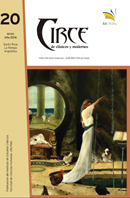Qué significa la divina providencia en la teología de Filón de Alejandría
Palabras clave:
providencia divina, Filón de Alejandría, platonismo, estoicismoResumen
La providencia divina (πρόνοια τοῦ θεοῦ) en los textos de Filón de Alejandría es un concepto filosófico o religioso que señala el cuidado de Dios por sus criaturas. Como fuente primera debemos acudir al Timeo para encontrar la idea platónica de la providencia sostenida por el axioma de que Dios no es la causa del mal, un principio que Filón sigue en su teodicea. Los filósofos estoicos tomaron de Platón la idea de la providencia divina y la adaptaron a su propia filosofía materialista. Conjugando elementos platónicos y estoicos Filón expresa en varios lugares su idea sobre la providencia de Dios. Escribió dos tratados titulados Sobre la Providencia –probablemente en la última etapa de su vida–, que aquí comentaremos someramente. En La creación del mundo según Moisés 171-172, Filón ofrece un compendio de su teología donde aparece su idea de Dios, y por tanto su teoría de la creación y el concepto de providencia. El análisis se concentrará en la explicación de la providencia en los tratados históricos y en la particular construcción del concepto en la sociedad patriarcal judeohelenística.
Descargas
Descargas
Publicado
Número
Sección
Licencia
Los autores que tengan publicaciones con esta revista, aceptan los términos siguientes referidos a los derechos de autor/a:
1. Los autores/as conservarán sus derechos de autor y garantizarán a la revista el derecho de primera publicación de su obra, el cuál estará simultáneamente sujeto a la Licencia de reconocimiento de Licencia Creative Commons Atribución-NoComercial-CompartirIgual 4.0 Internacional (http://creativecommons.org/licenses/by-nc-sa/4.0/). que permite a terceros compartir la obra siempre que se indique su autor y su primera publicación esta revista. El autor es el titular del copyright.
2. Los autores/as podrán adoptar otros acuerdos de licencia no exclusiva de distribución de la versión de la obra publicada (postprint) siempre que se indique la publicación inicial en esta revista. La cesión de derechos no exclusivos implica también la autorización por parte de los autores para que el trabajo sea depositado en el repositorio institucional y difundido a través de las bases de datos que el editor considere adecuadas para su indización, con miras a incrementar la visibilidad de la publicación y de sus autores.
3. Se permite y recomienda a los autores/as difundir su obra a través de Internet antes y durante el proceso de envío, lo cual puede producir intercambios interesantes y aumentar las citas de la obra publicada.







.jpg)









2.png)



